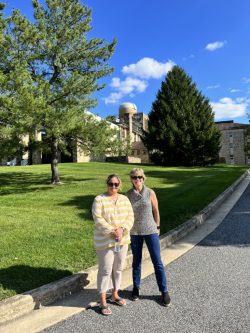I’m among the last of my colleagues to write on our 2024 theme, Cultivate Our Garden. My mother-in-law – a master gardener – would find that fitting. She still remembers and teases me about my offer, early in my courtship of her daughter, to “dig a cucumber from the garden” for her. My particular Southern California childhood was quite deficient when it came to ingratiating myself with my future wife’s Yankee, do-it-yourselfer parents.

I still have a somewhat low inclination to tend to my non-human surroundings, although I am so far having success with a hearty spider plant and two Monsteras that live right next to my desk. Neither variety is known for the great care they demand, and I’ve come to like having these green beings around me. Learning to listen to them is good for me to get out of my head before or after my Zoom meetings with the young humans that I attend to much more naturally and with much more eagerness and curiosity as they navigate their high school years and look ahead to college.
I’m a fan of carpe diem movies and plays, from the recent movie Perfect Days (a slow burn, as they say, but highly recommended) to old stand-bys like Ground Hog’s Day, About Time and the play Our Town. Most of these demonstrate the way that living a life of care and close attention to the physical world right in front of us — people, plants, and objects — brings joy and even salvation, in a sense.
 Candide, who in partnership with Don and Sarah McMillan, started us on this exploration of garden-tending, set out on his journey as a person who also lived a bit in his head, full of optimism and high ideals. As tends to happen when your ideas fly in the face of reality, reality always wins. The hardships Candide experienced brought him back home more grounded and focused on the people and the land right in front of him. We must cultivate our garden, he concluded. In spite of all the greed, anger, and ignorance in us and in the world, we’d best value and devote ourselves to the small, tangible acts of care for the human and other beings right around us.
Candide, who in partnership with Don and Sarah McMillan, started us on this exploration of garden-tending, set out on his journey as a person who also lived a bit in his head, full of optimism and high ideals. As tends to happen when your ideas fly in the face of reality, reality always wins. The hardships Candide experienced brought him back home more grounded and focused on the people and the land right in front of him. We must cultivate our garden, he concluded. In spite of all the greed, anger, and ignorance in us and in the world, we’d best value and devote ourselves to the small, tangible acts of care for the human and other beings right around us.
I can’t think of a better theme to live by. For me, this means occasionally remembering to touch the dirt in my spider and Monstera plants to see if they’re thirsty. It means going for walks between my Zoom meetings to clear my head, to feel the ground under my feet and the wind on my face before I come up with my next bright idea to be helpful to the students and families I work with. It means picking up the phone to call my mom or my daughter, or putting it down to be with the loved ones I’m lucky to have right in front of me.

Sometimes my walks and my efforts to refocus on the tangible world right around me can lead to clarity about the next step to take. Sometimes the best next step is to do nothing. Just as I need to learn to tend and appreciate my unique garden-world in the face of my particular upbringing, strengths, weaknesses, and neuroses, so too do my students. I can suggest useful techniques and practices, but they often do well to reject my ideas and listen to what only they can know to be true. Coming to know and trust the qualities of the seed and soil that is uniquely each of us is the work of a lifetime, and my students will certainly end up eating better if they don’t join me in digging for cucumbers.


